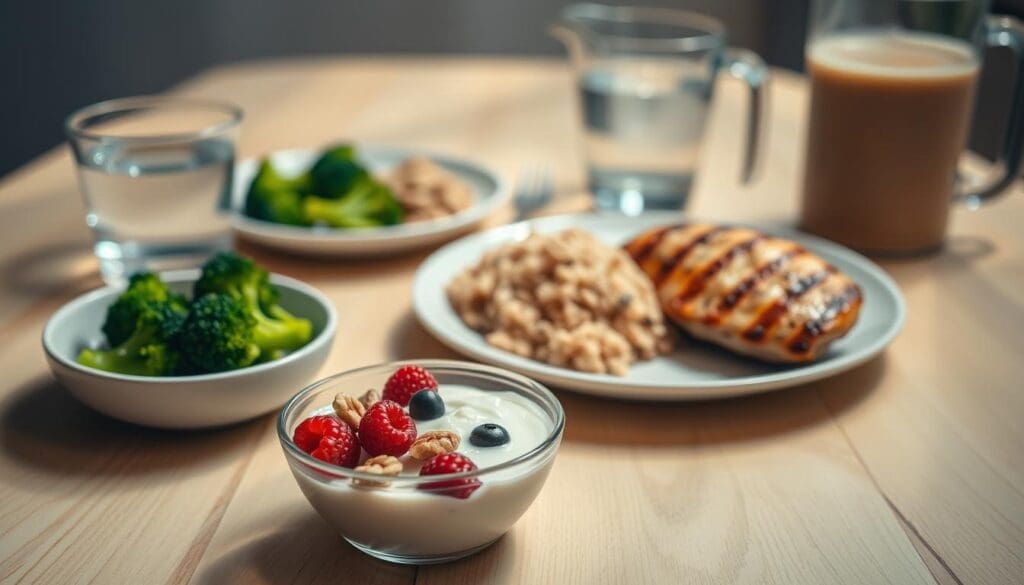Last Updated on November 26, 2025 by Bilal Hasdemir

After gastric sleeve surgery, patients must follow a special diet. This helps them recover well and keep weight off long-term. At Liv Hospital, our team helps at every step. We use the latest in bariatric care. At 1 month post op gastric sleeve what to eat is critical. Get the best tips for this stage and your essential long-term diet for success.
One month after surgery, patients start eating soft, solid foods. We suggest eating lean protein, low-fat dairy, and cooked vegetables in small amounts. A good post-operative diet is key for a smooth recovery and lasting weight loss.

Gastric sleeve surgery starts a big change in our lives. We learn about our new stomach and follow special diets. It’s key to know what’s happening in our body and how to recover well.
After surgery, our stomach is much smaller. It’s like a sleeve now. This change helps us eat less and lose weight. Knowing this is important for our eating habits and health.
Our new stomach changes how we digest food. We need to eat smaller, more frequent meals. This helps us get the nutrients we need without discomfort.
Following the diet after surgery is very important. It helps us heal and avoid problems. The diet starts with clear liquids and moves to solid foods slowly. This lets our stomach heal and reduces risks.
The diet also helps with common issues like nausea. By slowly adding foods, we can handle any problems early. Drinking plenty of water and taking supplements are also key.
In summary, recovering from gastric sleeve surgery is a big journey. We need to understand our new stomach and follow the diet closely. With the right approach, we can overcome challenges and get the best results from our surgery.

After gastric sleeve surgery, the diet goes through several phases. These phases help patients recover smoothly and avoid complications. We guide our patients through each phase to ensure they heal well.
The first phase is the clear liquid phase, lasting from days 1 to 7. It’s important to only drink clear liquids to help your stomach heal. Examples include:
Staying hydrated is key. Drink these liquids all day. Avoid straws to prevent gas and discomfort.
From days 8 to 14, you move to the full liquid phase. You can now add more substantial liquids to your diet. This includes:
Avoid thick or creamy liquids. Focus on protein-rich beverages for nutrition.
By day 15-21, you can start eating pureed foods. Foods should be blended smooth to avoid discomfort. Examples include:
Eat small, frequent meals. Keep your diet rich in protein and low in sugar and fat. Listen to your body and adjust your diet as needed.
Following this diet progression helps patients smoothly move from liquids to solid foods. It reduces the risk of complications and supports recovery.
Reaching the one-month mark after gastric sleeve surgery is a big deal. It’s time to learn about the diet changes that help your recovery and health. Your stomach is healing, and what you eat is key to a smooth recovery.
By the fourth week, you’ll start moving from pureed foods to soft ones. Soft foods are gentle on your mouth and throat. They also give you the nutrients you need. Some examples are:
It’s important to add these foods slowly to avoid any issues. Start with small amounts and watch how your body reacts.
Protein is essential for healing and keeping your muscles strong. Recommended protein sources include:
Try to eat at least 60 grams of protein each day. Protein shakes are handy if you find it hard to get enough protein from solid foods.
Vegetables and fruits are packed with vitamins, minerals, and fiber. Cooked vegetables are better for your stomach than raw ones. Choose soft, ripe fruits. Some good options are:
Slowly add different colors to your diet to get a wide range of nutrients.
Even with soft foods, portion control is important. Eat small meals often to avoid feeling too full. Good techniques include:
These tips help you adjust to your new stomach and avoid discomfort.
After gastric sleeve surgery, patients hit a key dietary milestone at the one-month mark. At this time, the stomach is healing, and the body is adjusting to its new shape. Eating the wrong foods can cause discomfort, nausea, and even nutritional problems.
High-sugar and high-fat foods are big no-nos after gastric sleeve surgery. They’re hard to digest and can lead to dumping syndrome. This condition causes fast stomach emptying, leading to diarrhea, cramps, and flushing. It’s best to avoid foods like cakes, cookies, fried foods, and sugary snacks.
Examples of high-sugar and high-fat foods to avoid:
Some foods are hard to digest, and after surgery, it’s even tougher. Foods like tough meats, dry bread, and raw veggies can be a problem. It’s better to choose softer, easier-to-digest foods.
Tips for managing difficult-to-digest items:
Some drinks can also slow down recovery. Drinks like carbonated ones, caffeinated drinks, and those with a lot of sugar can cause discomfort and gas. Stick to water, clear broths, and drinks with electrolytes.
Beverages to limit or avoid:
By following these dietary tips, patients can make it through the first month after surgery more easily. This sets them up for success in the long run.
Nutritional guidelines are key for a smooth recovery after gastric sleeve surgery. Following these guidelines helps patients stay healthy and feel their best.
After surgery, patients need enough protein to heal and keep muscle. We suggest eating 60-80 grams of protein daily. Spread it out over three meals and 2-3 snacks.
To get enough protein, eat a variety of foods. Include lean meats, fish, eggs, dairy, and plant-based options like beans and tofu.
| Food | Protein Content (per serving) |
| Chicken breast | 30-40 grams |
| Fish (salmon, tilapia) | 20-30 grams |
| Eggs | 6-7 grams per egg |
| Greek yogurt | 15-20 grams |
| Legumes (lentils, chickpeas) | 15-18 grams per 1 cup cooked |
Patients may need extra vitamins and minerals after surgery. Always talk to your healthcare provider about the right supplements for you.
Recommended supplements include:
“Supplementation is key to preventing nutritional deficiencies after gastric sleeve surgery. Patients should work closely with their healthcare team to ensure they’re getting the necessary nutrients.”
Drinking enough water is essential for health and recovery. Aim for at least 64 ounces (1.9 liters) of fluid daily. Drink water all day long.
Avoid drinks with caffeine or lots of sugar. Check your urine color to see if you’re drinking enough; it should be pale yellow or clear.
By following these guidelines, patients can help their recovery. They can avoid complications and achieve success after gastric sleeve surgery.
Knowing how much to eat after bariatric surgery is key to a smooth recovery. After gastric sleeve surgery, your body needs different nutrients. It’s important to watch your calorie intake to heal well and keep the weight off.
In the first few weeks after surgery, you’ll need only 500-800 calories a day. This helps your stomach heal and avoids problems. “Good nutrition is essential, even with fewer calories,” as it aids in healing and keeps you healthy.
Choose foods and drinks that are full of nutrients. Go for protein shakes, clear broths, and soft foods. These are packed with vitamins and minerals.
As you get better, you’ll need more calories. Your doctor will help figure out how many. You’ll slowly add more calories over time.
A slow increase in calories helps your body adjust. It also supports lasting weight loss. Watch how your body reacts to more calories and adjust if needed to avoid problems.
It’s important to keep an eye on your calories, but don’t get too caught up. Finding a balance is the goal. Use a food diary to track what you eat and how many calories you consume. This helps you stay on track without overdoing it.
Focus on making lasting lifestyle changes instead of just following a strict diet. Eat foods that are good for you and listen to your body’s hunger and fullness signals. This way, you can have a healthy relationship with food after surgery.
By managing your calorie intake well, you can help your recovery, reach your weight loss goals, and boost your health and happiness.
Gastric sleeve surgery is just the start. A long-term diet plan is key for lasting weight loss and health. It’s important to know the dietary changes needed at each stage after surgery.
At 6 months post-op, patients get used to new eating habits. The diet should focus on nutrient-rich foods like protein, veggies, and whole grains. Avoiding high-sugar and high-fat foods is also important.
Start adding different foods slowly. Watch how your body reacts and adjust your diet as needed. It’s also a good time to introduce more textured foods.
By 1 year post-op, your diet should be balanced and nutrient-rich. Aim for 800-1200 calories a day, with plenty of protein to support health and weight loss.
| Nutrient | Recommended Daily Intake |
| Protein | 60-80 grams |
| Calories | 800-1200 calories |
| Fruits and Vegetables | 5 servings |
Two to three years after surgery, focus on keeping a healthy weight and balanced nutrition. Stick to a diet rich in whole foods, lean proteins, and a variety of fruits and veggies.
Regular check-ups with healthcare providers are vital. They help monitor nutritional deficiencies and adjust your diet as needed.
Long-term success after gastric sleeve surgery requires dedication to healthy eating and lifestyle. This includes regular exercise, mindful eating, and support from healthcare and support groups.
By following these guidelines and staying committed, patients can achieve lasting success and enjoy the benefits of their surgery.
After gastric sleeve surgery, patients face both physical and emotional changes. It’s key to tackle the psychological aspects of eating after surgery.
Building a healthy relationship with food is essential for success after gastric sleeve surgery. This means understanding hunger and fullness, eating slowly, and picking nutrient-rich foods. Here’s what we suggest:
By following these tips, patients can develop a positive food relationship. This supports their health and weight loss goals.
Social eating can be tough after gastric sleeve surgery. We suggest preparing for these situations by:
Being ready and confident helps patients handle social eating. They can stick to their diet and enjoy social times.
Transfer addiction, or replacing one addiction with another, is a risk after surgery. It’s important to spot the signs, like too much exercise or substance use.
To avoid transfer addictions, patients should:
Being aware and proactive helps prevent transfer addictions. This way, patients can keep a healthy, balanced lifestyle.
Proper nutrition is key after gastric sleeve surgery. Following the diet plan, from clear liquids to soft foods, is essential. This helps ensure a good recovery.
Sticking to the dietary guidelines helps with weight loss and avoids complications. It’s important to eat a balanced diet. This should include lots of protein, vitamins, and minerals for health.
Knowing what to eat after surgery helps make better choices. This leads to a healthier weight loss journey. We suggest working with your healthcare team to create a nutrition plan. This ensures the best results after surgery.
One month after surgery, you can start with soft foods. This includes protein, veggies, and fruits. Make sure to chew well and eat slowly.
Early on, you might need only 500-800 calories a day. As you get better, you’ll need more. But always watch your calorie intake to stay healthy.
Stay away from foods high in sugar and fat. Also, avoid hard meats and dry bread. Limit drinks like soda and snacks with lots of calories.
You’ll need about 60-80 grams of protein daily. This helps with healing and losing weight.
Long-term, eat a balanced diet with lots of protein, veggies, and fruits. By 6 months, you can eat more foods. After a year, keep making healthy food choices to keep your weight off.
Social eating can be tough. Plan ahead, eat slowly, and choose healthy foods. Talking to a dietitian or therapist can also help.
Ignoring diet guidelines can lead to malnutrition, dehydration, or stomach problems. Always work with your healthcare team for a smooth recovery.
Focus on eating healthy foods. Use a food diary or app to track calories. Regular check-ins with your healthcare team can also keep you on track.
It’s best to limit or avoid carbonated drinks. They can cause discomfort and gas, and may lead to complications.
Transfer addiction might show as cravings for substances or compulsive behaviors. Recognizing these signs is key. Seeking help from a therapist or counselor is important.
Moizé, V., Andreu, A., Flores, L., Torres, F., Ibarzabal, A., Delgado, S., & Vidal, J. (2013). Protein intake and lean tissue mass retention following bariatric surgery. Nutrients, 5(12), 5282–5293. https://pmc.ncbi.nlm.nih.gov/articles/PMC5347111/
Subscribe to our e-newsletter to stay informed about the latest innovations in the world of health and exclusive offers!